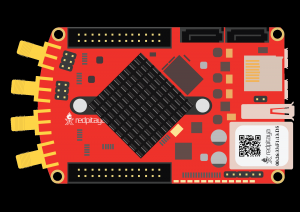2.3.6.8.5. SPI (HW api)
2.3.6.8.5.1. Description
This example shows communication with the Red Pitaya SPI. This code is for testing writing and reading via the SPI protocol. In order for the code to work, you need to connect the MISO and MOSI connectors.
2.3.6.8.5.3. Code - C
Note
Although the C code examples don’t require the use of the SCPI server, we have included them here to demonstrate how the same functionality can be achieved with different programming languages. Instructions on how to compile the code are here.
/* @brief This is a simple application for testing SPI communication on a RedPitaya
*
* (c) Red Pitaya http://www.redpitaya.com
*
* This part of code is written in C programming language.
* Please visit http://en.wikipedia.org/wiki/C_(programming_language)
* for more details on the language used herein.
*/
#include <stdio.h>
#include <stdlib.h>
#include <string.h>
#include "rp_hw.h"
int main(int argc, char *argv[]){
char *buffer = "TEST string";
char rx_buf[255];
memset(rx_buf,0,255);
int res = rp_SPI_InitDevice("/dev/spidev1.0"); // Init spi api.
printf("Init result: %d\n",res);
res = rp_SPI_SetDefaultSettings(); // Set default settings.
printf("Set default settings: %d\n",res);
res = rp_SPI_GetSettings(); // Get uart speed.
printf("Get current settings of spi: %d\n",res);
res = rp_SPI_SetMode(RP_SPI_MODE_LIST); // Set SPI mode: Low idle level, sample on trailing edge.
printf("Set mode: %d\n",res);
res = rp_SPI_SetSpeed(50000000); // Set SPI speed.
printf("Set speed: %d\n",res);
res = rp_SPI_SetWordLen(8); // Set word bit size.
printf("Set word length: %d\n",res);
res = rp_SPI_SetSettings(); // Apply settings to SPI.
printf("Set settings: %d\n",res);
res = rp_SPI_CreateMessage(2); // Create 2 message.
printf("Set settings: %d\n",res);
res = rp_SPI_SetBufferForMessage(0,(uint8_t*)buffer,true,strlen(buffer),false); // Set buffer for first message and create RX buffer.
printf("Set buffers for first msg: %d\n",res);
res = rp_SPI_SetBufferForMessage(1,0,true,100,false); // Create RX buffer.
printf("Set buffers for second msg: %d\n",res);
res = rp_SPI_ReadWrite(); // Pass message to SPI.
printf("Read/Write to spi: %d\n",res);
uint8_t *rx_buffer = 0;
size_t rx_size = 0;
res = rp_SPI_GetRxBuffer(0,&rx_buffer,&rx_size); // Get pointer to rx buffer. No need free buffer. Api itself destroy buffer.
if (rx_buffer)
printf("Read message: %s (res %d)\n",rx_buffer,res);
res = rp_SPI_DestoryMessage();
res = rp_SPI_Release(); // Close spi api.
printf("UnInit result: %d\n",res);
return 0;
}
2.3.6.8.5.4. Code - MATLAB®
%% Define Red Pitaya as TCP client object
IP = '192.168.178.56'; % Input IP of your Red Pitaya...
port = 5000;
RP = tcpclient(IP, port);
%% Open connection with your Red Pitaya
RP.ByteOrder = "big-endian";
configureTerminator(RP,"CR/LF");
writeline(RP,'SPI:INIT:DEV "/dev/spidev1.0"');
writeline(RP,'SPI:SET:DEF'); % set default settings
writeline(RP,'SPI:SET:GET'); % get default settings
writeline(RP,'SPI:SET:MODE LIST'); % set mode: Low idle level, sample on trailing edge
fprintf('Mode %s\n', writeread(RP,'SPI:SET:MODE?')); % check current mode setting
writeline(RP,'SPI:SET:SPEED 5000000'); % set spi speed
fprintf('Speed %s\n', writeread(RP,'SPI:SET:SPEED?')); % check current speed setting
writeline(RP,'SPI:SET:WORD 8'); % set word length
fprintf('Word length %s\n', writeread(RP,'SPI:SET:WORD?')); % check current speed setting
writeline(RP,'SPI:SET:SET'); % apply setting to spi
%% Work with spi messages
writeline(RP,'SPI:MSG:CREATE 2'); % create 2 messages with diffrent buffers
fprintf('Check message count %s\n', writeread(RP,'SPI:MSG:SIZE?'));
writeline(RP,'SPI:MSG0:TX4:RX 13,14,15,16'); % sets the first message to write and read buffers of 4 bytes
writeline(RP,'SPI:MSG1:RX7:CS'); % Sets the buffer for the second message to read 7 bytes long and switch the CS signal level
writeline(RP,'SPI:PASS'); % sends data to SPI
fprintf('TX buffer of 1 msg %s\n', writeread(RP,'SPI:MSG0:TX?'));
fprintf('RX buffer of 1 msg %s\n', writeread(RP,'SPI:MSG0:TX?'));
fprintf('RX buffer of 2 msg %s\n', writeread(RP,'SPI:MSG1:RX?'));
writeline(RP,'SPI:MSG:DEL'); % Deletes messages
%% Close connection with Red Pitaya
writeline(RP,'SPI:RELEASE'); % close spi
clear RP;
2.3.6.8.5.5. Code - Python
Using just SCPI commands:
#!/usr/bin/env python3
import sys
import time
import redpitaya_scpi as scpi
rp_s = scpi.scpi(sys.argv[1])
rp_s.tx_txt('SPI:INIT:DEV "/dev/spidev1.0"')
print("Init SPI")
rp_s.tx_txt('SPI:SET:DEF')
print("Set default settings")
rp_s.tx_txt('SPI:SET:GET')
print("Get settings")
rp_s.tx_txt('SPI:SET:MODE LIST')
print("Set mode")
rp_s.tx_txt('SPI:SET:MODE?')
print("Get mode:",rp_s.rx_txt())
rp_s.tx_txt('SPI:SET:SPEED 5000000')
print("Set speed")
rp_s.tx_txt('SPI:SET:SPEED?')
print("Get speed:",rp_s.rx_txt())
rp_s.tx_txt('SPI:SET:WORD 8')
print("Set word length")
rp_s.tx_txt('SPI:SET:WORD?')
print("Get word length:",rp_s.rx_txt())
rp_s.tx_txt('SPI:SET:SET')
print("Set settings")
rp_s.tx_txt('SPI:MSG:CREATE 2')
print("Create message")
rp_s.tx_txt('SPI:MSG:SIZE?')
print("Message size:",rp_s.rx_txt())
rp_s.tx_txt('SPI:MSG0:TX4:RX 13,14,15,16')
print("Set message")
rp_s.tx_txt('SPI:MSG1:RX7:CS')
print("Set message 2")
rp_s.tx_txt('SPI:PASS')
print("Pass message")
rp_s.tx_txt('SPI:MSG0:TX?')
print("Tx buffer:",rp_s.rx_txt())
rp_s.tx_txt('SPI:MSG0:RX?')
print("Received data:",rp_s.rx_txt())
rp_s.tx_txt('SPI:MSG1:RX?')
print("Received data 2:",rp_s.rx_txt())
rp_s.tx_txt('SPI:MSG1:CS?')
print("CS state for message 2:",rp_s.rx_txt())
rp_s.tx_txt('SPI:MSG:DEL')
print("Delete message")
rp_s.tx_txt('SPI:RELEASE')
print("Release SPI")
Using functions:
#!/usr/bin/env python3
IP = 'rp-f07f1e.local' # IP working Red Pitaya
spi_mode = 'list'
cs_mode = 'normal'
speed = 5e6
word_len = 8
rp_s = scpi.scpi(IP)
rp_s.tx_txt('SPI:INIT:DEV "/dev/spidev1.0"')
print("Init SPI")
rp_s.tx_txt('SPI:SET:DEF')
print("Set default settings")
rp_s.spi_set(spi_mode, cs_mode, speed, word_len)
print("\n")
rp_s.tx_txt('SPI:MSG:CREATE 2')
print("Create message")
rp_test.spi_get_settings()
print("\n")
rp_s.tx_txt('SPI:MSG0:TX4:RX 13,#H14,#B00001111,16')
print("Set message")
rp_s.tx_txt('SPI:MSG1:RX7:CS')
print("Set message 2")
rp_s.tx_txt('SPI:PASS')
print("Pass message")
rp_s.tx_txt('SPI:MSG0:TX?')
print("Tx buffer:",rp_test.rx_txt())
rp_s.tx_txt('SPI:MSG0:RX?')
print("Received data:",rp_test.rx_txt())
rp_s.tx_txt('SPI:MSG1:RX?')
print("Received data 2:",rp_test.rx_txt())
rp_s.tx_txt('SPI:MSG1:CS?')
print("CS state for message 2:",rp_test.rx_txt())
rp_s.tx_txt('SPI:MSG:DEL')
print("Delete message")
rp_s.tx_txt('SPI:RELEASE')
print("Release SPI")
rp_s.close()
Note
The Python functions are accessible with the latest version of the redpitaya_scpi.py document available on our GitHub. The functions represent a quality-of-life improvement as they combine the SCPI commands in an optimal order. The code should function at approximately the same speed without them.
For further information on functions please consult the redpitaya_scpi.py code.
